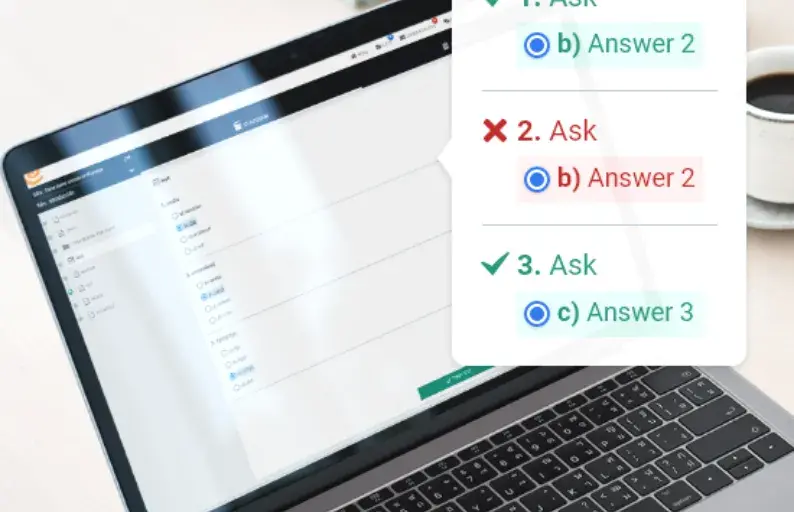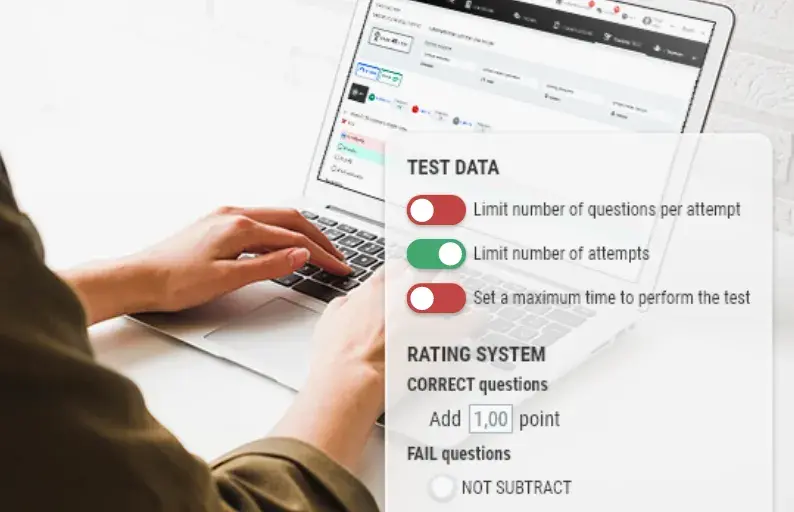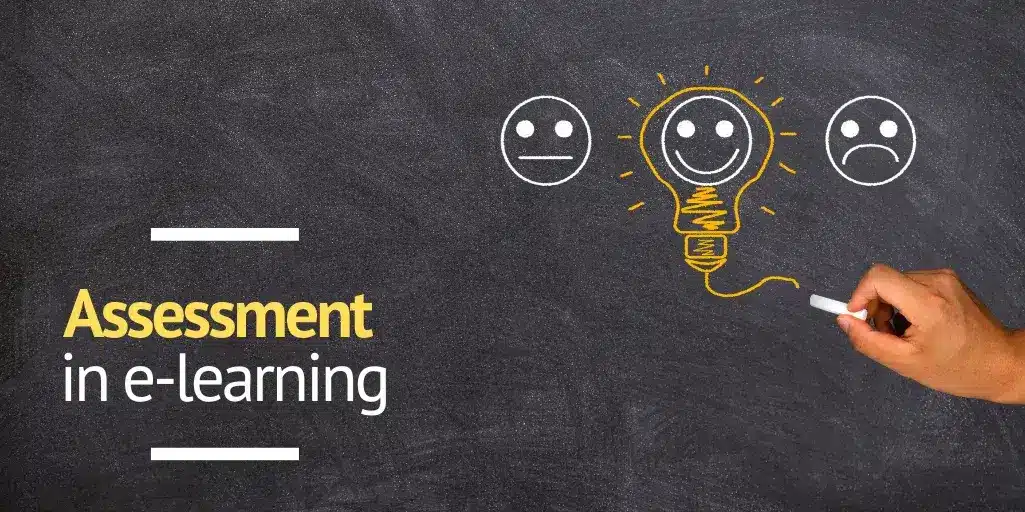One of the main dilemmas when getting into e-learning is how to evaluate an online course. This makes perfect sense, as e-learning evaluation is extremely important. Not only because it provides the learner with a grade that testifies to the successful completion of requirements, but also because it reflects the effort made in a fair way (or so it should be).
Although the online course evaluation may seem more complicated than a face-to-face one, it is certainly possible to carry it out in a simple and rigorous way.
Read on to discover how to evaluate online courses and why it is one of the most important issues in any training!

Without proper evaluation of online classes, the online learning process would lose its purpose. To neglect it would mean that some of the participants would stop working on the proposed tasks out of sheer laziness.
Moreover, although assessment (at the outset) may be a bit complicated to define and set up, we do not recommend not doing it, as it has great relevance in the classroom and beyond.
In fact, as well as being useful for the students, it is also useful for the school, as the results are able to clearly decipher the success of a programme or possible improvements.
Aspects that online evaluation methods can shed light on
How to evaluate an online course correctly?
We know the importance of evaluation for online classes in deciding whether a learner passes or fails a course. But, on the other hand, it also provides us with valuable information. In particular, it provides us with data on the follow-up and evolution of our courses, which is very useful for making decisions. In other words, it reveals whether the training provides value, whether it complies and whether it is appropriate.
Does the training make a difference?
Firstly, we find the social aspect, which makes us question whether the training process has brought any benefit to the members of the student body and, by extension, to society as a whole.
Does the training deliver?
We also find a second aspect related to pedagogy, which is key to knowing whether the programme itself works for what it was designed to do.
Does the training work?
Finally, we must highlight the economic factor. Every training process has costs and benefits. In this way, with the data obtained, we can find out whether the investment has been worthwhile or not.
Define the evaluation criteria for online training

Who evaluates the learners?
In an e-learning platform, you have to determine who will be in charge of the evaluation.
The person in charge of evaluation could be the person who communicates with the learners via the learning platform and who participates in the online evaluation manually. Alternatively, it could be the platform that is pre-programmed for this.
In this respect, one idea is to opt for a middle ground between the two options, so that automatic tests are given, but the teaching team also sets up activities to be assessed manually.
When is e-learning assessment carried out?
In the same way, tasks should be proposed, delivered and reviewed throughout the training process, so that the learner receives regular feedback and can learn from his or her mistakes. In this way, there will be a sustained progression throughout the course.
How to evaluate an online course?
In the same way, the question of how to evaluate an online course must also be asked. Fortunately, there are several possible answers to this question.
On the one hand, you can take final exams and mid-term exams, or you can opt for practical assessment and leave the exams aside. At the same time, depending on the field of knowledge to be taught, some assignments can be submitted. This activity can even be introduced to be carried out in a group.
To tell the truth, there is a diversity of options and combinations to choose from. These are just a few patterns to take into account in order to offer an effective online evaluation system.
Ways to evaluate an online course

How to evaluate an online course? Many!
In our opinion, evaluation and self-evaluation are an essential part of any kind of training. They are imperative in order to monitor learners and check whether they are really acquiring the necessary knowledge.
However, in face-to-face courses, this assessment may seem easier to do because the teacher gives tests and activities to verify ‘live’ learning.
In a distance learning course, on the other hand, there is no direct contact with the teacher, which makes e-learning assessment even more important. But how can we perceive (behind the screen) that the learner is really making an effort?
In this sense, in order to be clearer about the situation of each learner, different types of e-learning assessment have to be carried out.
Here are some ideas on how to evaluate an online course! Later on, we will tell you about more comprehensive solutions.
Self-evaluation
Self-assessment consists of learners doing online case study activities on what they are learning and how they are doing in the subject.
This way, while they are doing them, they can observe their own mistakes, which will also help them to improve.
And what good is this to the teacher? A great deal, actually. The teacher will be able to access each student’s data and observe their progress. They will be able to see what their mistakes have been and how many times they have practised.
Although this data is not usually assessed as part of the final marks, it is good for students to keep track of what they have learnt.
Tests and exams

Quizzes and tests also allow us to find out, more or less reliably, how much knowledge each student has. Both are ways of assessing online in an agile way, regardless of the type of test.
And not only can they be proposed and solved in different ways, but they can also be individually configured so that they carry more or less weight in the final marks.
In addition, as with the rest of the activities, the students themselves will be able to check their results.
Assessable assignments
Undoubtedly, one of the best options. With them, you can observe what the students have learned, if they have absorbed the theoretical content adequately and if they are able to put it into practice.
An example of this could be a videoconference presentation or the sending of a video on certain topics. These are great for accrediting that a learner has acquired certain competences.
At the same time, role-playing or other group dynamics can be used successfully in an e-learning platform to assess learners. All this, without forgetting that these virtual environments offer tools, such as discussion forums and others, which add possibilities when it comes to assessing learners.
In short, choose the alternatives that you consider convenient to evaluate your learners in your e-learning courses. But always put the focus on the learner and provide him/her with the learning and the means for a positive outcome.
How to evaluate an online course in an LMS

Knowing how to evaluate students online has a lot to do with the online evaluation tools and instruments offered by the e-learning platform.
With a good online platform you will not only be able to evaluate the learning of your learners, but you will also be able to follow them closely and measure the results of the course with comprehensive reports.
An effective and convenient online teacher evaluation system
Specifically, when we talk about ‘grading’ we refer to the possible actions that need to be allowed for the teacher to be able to correct, grade and give marks at the end of the course.
When assessing the elements that form part of the mark (correction exercises, tests, group discussions, etc.), the teacher must be able to see which students have completed them and which have not, and have access to each attempt and the mark they have obtained.
It would also be logical for the grading system and the criteria for passing the course to be configurable.
In other words, ideally, both a manual and an automatic grading system could be set up. In other words, the final grade for the course or for each subject would be calculated on reaching 100% of the activities, in the case of automatic assessments.
It would be convenient, in the case of manual marking, for the system itself to send warnings to the teacher to indicate that he/she has to enter these marks manually.
Assessment tools
As you will see below, there are many tools for the evaluation of online classes. evolCampus, for example, offers a configurable grading system and this range of activities that you will see below and that you can use as a reference for your courses. The great thing is to choose among its multiple options, assign values and pass criteria to them, and configure them so that they are executed according to your guidelines.
- Development exercises with options to write text, attach file or record audio
- Multi-response tests with different performance types
- Self-assessment opportunities which, although not evaluable, form part of the training
- Variety of configurable activities (text, audio or video)
- Activities external to the platform (gradable assignments or practicals)
- Questionnaires and surveys (can be marked as a compulsory activity)
- Group discussions (graded by the teacher and are part of the grade)
- SCORM format
In the same way, it offers other interesting e-learning assessment tools to monitor learners’ progress. Such is the case of the notices that you can send to students and coordinators.
To the former, when they accumulate a specific amount of time of inactivity on the campus or when they comply with one of the programmed alerts. And to the latter, when a student has reached the criteria for passing the course.
One last note on how to evaluate an online course
Find a comprehensive evaluation tool for online classes that makes it easy for you.
And, of course, beyond the online evaluation itself, assess your learners’ learning and what you were able to do to make it happen.
